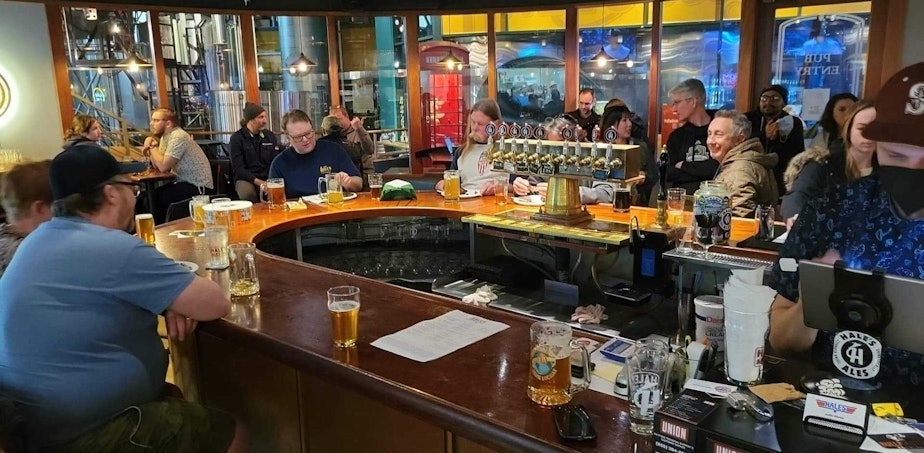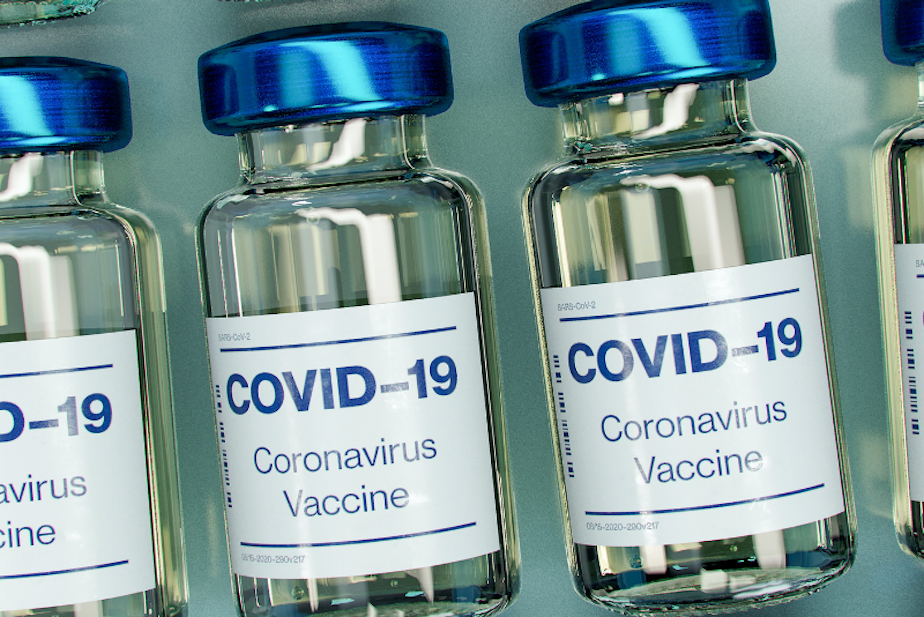Mayor Harrell is trying to make it cool to say 'I love Seattle': Today So Far

- While discussing his first 100 days in office, Seattle Mayor Bruce Harrell pointed to three things he's been focused on so far. Part of that is how he wants it to be cool to say "I love Seattle."
- Also, now that the federal mask mandate is going away, a wave of mask-optional policies is moving through Washington's public transit agencies.
This post originally appeared in KUOW's Today So Far newsletter for April 19, 2022.
Seattle Mayor Bruce Harrell wants it to be "cool" to say "I love Seattle."
That was part of a conversation Mayor Harrell recently had with journalist Joni Balter at Seattle University, while discussing his first 100 days in office. He focused on three things that have occurred within this time.
"One is not really cool, and sexy, and exciting. It's doing an internal evaluation of the systems, or lack of systems, the city has. For example, how to deal with some of this unfortunate living in a tent that is obstructing sidewalks, that's in a park. And we don't have housing for them ... Do you just remove them? Do you find them services? ... They may look alike, but they are not alike ... you would think that as mayor, I could call someone and say, 'I'd like to take care of this person.' But the systems are not there."
The second thing: Harrell has been looking for leaders, filling department head positions, and conducting talent searches. He says it's slow-going but "if things can change quickly they can be broken quickly."
The third thing is "changing the narrative of the city."
Sponsored
"I love this city. It's easy to take a brick and throw it toward someone out of anger. But I'm trying to change the conversation when it comes to race and social justice, when it comes to police reform, business revitalization ... I'm trying to make it cool to say 'I love Seattle.'"
That was just the start of the 100-day discussion, which covers a lot of territory. One other point that Harrell brought up was public safety and his thoughts on hiring new police officers.
"You do see that when I talk about public safety, and I talk about 'I need more officers,' I always lead with 'but not in a racialized or a militarized fashion,'" Harrell said, noting that Seattle is developing a third department that will not be a "gun and badge department."
"I tell you I need more officers, but a new kind of officer, the right kind of officers with the right kind of sensitivity," he said. "That's a new kind of conversation because I know what the defund movement was all about. I listened. I researched. And I know what we say in this city, and other cities, why people will get caught up in that narrative. But I must tell you that I believe that all communities have to be safe first."
You can hear the full conversation as part of KUOW's Speakers Forum here.
Sponsored
Transportation is going mask optional. I predict folks will be mask confused for a few days.
As soon as a federal judge knocked down the federal mask mandate for public transportation Monday, a wave of mask-optional policies moved over the United States, including right here in Washington state. Some are waiting to see if the ruling is appealed, but for now, it's mostly mask optional on buses, trains, airplanes, and automobiles. But there is some nuance to this development.
Alaska Airlines is going mask optional for domestic flights, but masks could still be required on international flights, such as to and from Canada. Uber is also going mask optional, but Lyft hasn't commented on the development yet. And just about everyone is sending the message that while masks are no longer required, please, pretty please, still wear them.
For example, take Sound Transit, which told the Associated Press this morning that mask requirements would not change on its trains and buses. But Sound Transit also told KUOW this morning that while its masking signs will stay up, it will no longer be enforcing its mask rule. News and decisions have moved fast over the past 24 hours, but that could be a bit confusing (Pierce Transit had similar mixed messages). Whatever the message, it basically means that nothing will really change on Sound Transit. Let's be honest, a mask mandate on Seattle-area public transportation has been about as effective as a bike ban at Green Lake. At least, that's my humble, anecdotal experience riding the light rail next to maskless passengers these past two years.
In the end, it's gonna come down to personal mask responsibility. I have a few good N95s that I wear at the store, restaurants and bars, etc. And often, I'm among a handful doing the same. It's important to note that Covid cases have been on a gradual rise in our area, with about 550 news cases each day. Hospitalizations and deaths, however, have been trending the opposite direction.
Sponsored
While we're living in quite a different, mask-optional pandemic world these days, some folks continue living with a reminder of Covid.
Long Covid remains a factor for many people who became ill. Symptoms range from chronic fatigue to lingering loss of taste and smell, to cognitive ailments (brain fog). Researchers are still trying to figure out how long Covid works, and why it affects some people more than others.
UW Medicine and Swedish Health Services are providing local data to the National Institute of Health for a new long Covid study that will help answer some questions.
Seattle Times Reporter Elise Takahama tells KUOW's Seattle Now that "some of the recent data is showing that it has to do with a person's immune response system. So if they get sick and their bodies responded, they might be producing autoantibodies and that ... continues to pose some problems within all parts of their body."
"There are a lot of lifestyle changes that people can do that doctors are recommending," Takahama adds. "The biggest ones right now are changing the way you eat, your diet, improving sleep, and getting some very intentional physical activity ... things like stretching, yoga, or more aerobic activities can help a lot.
Sponsored
AS SEEN ON KUOW

Members of The Hook at Hale's Ales as the Seattle brewery poured its last pint recently. Brewery owners opted to close up shop after decades brewing beer in Washington. (Jason M. Burrows / KUOW)
DID YOU KNOW
Hales Ales recently shut down its business based in Seattle. Beer aficionados are aware of Hale's presence in Ballard where it has grown a considerable following over the decades. But Ballard is not where Hale's originally started. Mike Hale first began brewing in an apartment in Colville, Wash. in 1983. A few years later, the brewery opened a location in Kirkland, which then moved to Ballard in 1995. Hale's Ales also opened a brewery in Spokane in 1992. Hale's also opened a barrelhouse in Bremerton, which is also slated to close.
Sponsored
ALSO ON OUR MINDS

Moderna says its new 'bivalent' vaccine shows promise against Covid variants
The pharmaceutical company Moderna announced Tuesday that a new version of the company's Covid-19 vaccine appears to provide stronger, longer-lasting protection against variants of the virus than the original vaccine.

